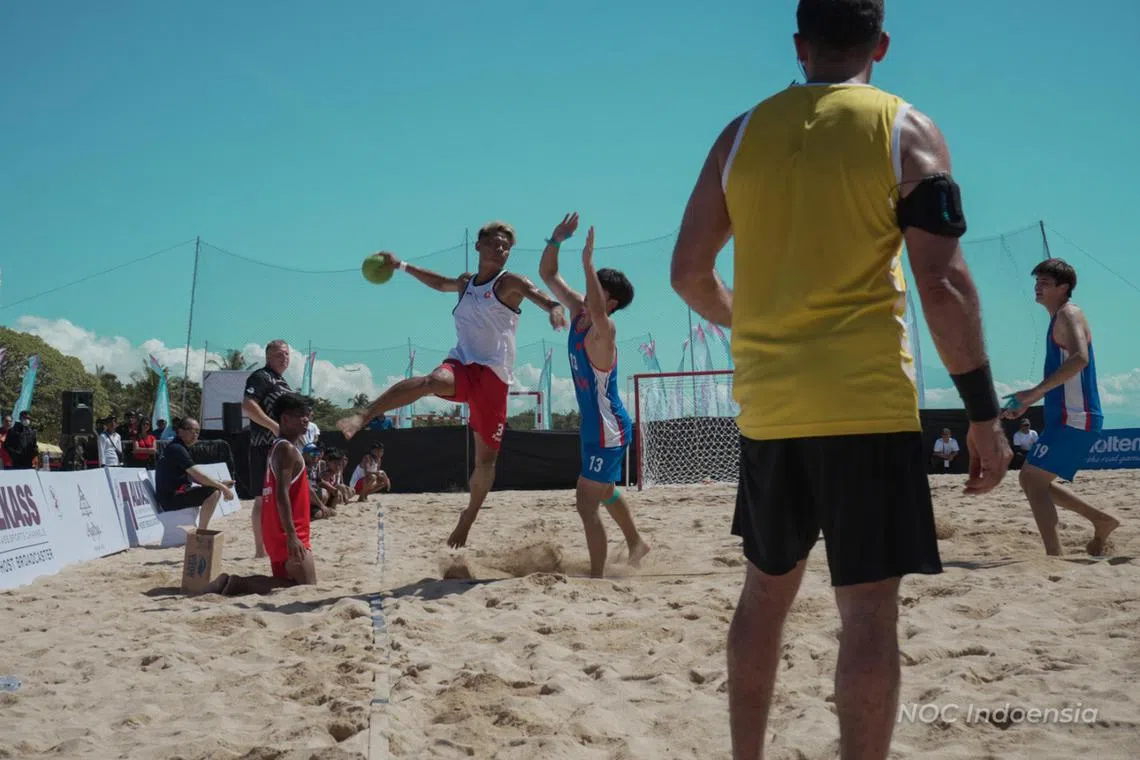Bali’s sporting dream at risk as its governor doubles down on anti-Israel stance
Sign up now: Get insights on Asia's fast-moving developments

A handball qualifying round being played for the World Beach Games in Bali in March. Some 1,600 athletes from 130 countries are expected for the August games.
PHOTO: INDONESIA NOC
Follow topic:
BALI - An international beach sporting event may be the latest victim of Bali’s hardline anti-Israel stance, after the governor of the Indonesian island made plain that he would not welcome Israeli teams.
On Saturday, Bali’s Governor Wayan Koster issued a statement saying teams representing Israel at the World Beach Games set to take place in August may not compete in the second instalment of the 14-event athletic competition.
In March, international soccer body Fifa stripped Indonesia of its right to host the youth World Cup
The Association of National Olympic Committees (ANOC), which awarded the games to Indonesia in 2022, was expected to respond to the governor’s statement soon, Ms Brighita Sesilya, spokesman for the Indonesian Olympic Committee, told The Straits Times.
“The president of the national Olympic committee of Indonesia, Raja Sapta Oktohari, will give an official statement after we get the letter from ANOC,” Ms Brighita said.
On Friday, Mr Raja met Mr Koster and the country’s sports minister Dito Ariotedjo to iron out differences and ensure that the World Beach Games, which brings together 1,600 athletes from 130 countries, goes ahead.
The triumvirate issued a statement that same day indicating that Mr Koster backed the games. The next day, the governor, who faces re-election in 2024, said his support hinged on the absence of any contingent from Israel.
“My attitude remains consistent in rejecting the presence of Team Israel at the World Beach Games in Bali in 2023,” the governor said in a written statement on Saturday.
Mr Koster said his view was consistent with Indonesia’s longstanding opposition to what it deems to be Israel’s mistreatment of Palestinians.
The World Beach Games in Bali “will run smoothly and successfully as long as they are held without the presence of the Israeli team, according to the agreement”, the statement said.
Repeated efforts by ST to reach Mr Dito as well as Mr Raja for comment were unsuccessful.
The 2023 World Beach Games will be the second iteration of the event, following its 2019 inaugural run in Qatar.
The event is a rare opportunity for Indonesian athletes to compete with Olympic-calibre international athletes. Indonesian President Joko Widodo has stated publicly that he intends for his country to vie for the 2036 Summer Olympics.
Hosting sporting events makes a splash economically too, according to a report published in April by the University of Indonesia (UI).
Ticket sales, hotel stays and money to spruce up stadiums and infrastructure in the six locations across Indonesia that were gearing up to host the Fifa youth tournament in May translated into a combined 4.4 trillion rupiah (S$395 million) fillip for those economies, which included those of Jakarta and Bali.
Running from days to weeks, and appealing to audiences potentially in the tens of millions, sporting events pay dividends for the local authorities.
The 2018 Asian Games opening ceremony in the Indonesian capital Jakarta
“Sporting events have a big multiplier effect, and they are a way of getting your city on the sporting map,” Mr Yusuf Kurniawan, a UI researcher and co-author of the report, told ST.
But with the exceptions of football and badminton, for all its 270 million-strong population, Indonesia punches well below its weight on the world sporting stage, having won a total of only eight gold Olympic medals – all in badminton.
This makes it tough for the country to attract big sporting events.
Indonesia’s beach soccer team, which competed in Thailand in March, scarcely had a month to practise after the Football Association of Indonesia found funding to send a contingent.
The team lost all six of their matches, placing dead last in 16th place, three spots behind landlocked Afghanistan.
“We don’t get much support,” Mr Ida Bayu Mahayasa, the team’s coach, told ST. “We don’t even have beach soccer leagues.”


